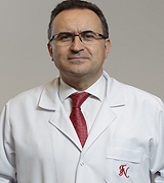A kidney transplant is a procedure of taking out a healthy kidney from a donor and placing it in the body of a patient whose kidneys have failed. It is a more suitable option than dialysis as it has better outcomes.
In Kidney Transplant Surgery donor's kidney is placed in the lower part of the abdomen and then its blood vessels and urine tube is attached to the bladder.
Usually, the procedure takes 2-3 hours to finish and is done under general anesthesia.
The surgeon makes a diagonal incision on either side of the body depending on the case. In general, the recipient's own kidney is left untouched in the body unless it is infected.
Kidney Transplant cost in Turkey is between USD 18000 to USD 22000. Patient has to stay in the hospital for 10 days and outside the hospital for 40 days. The total cost of the treatment depends on the diagnosis and facilities opted by the patient.The cost of Kidney Transplant includes:
Preoperative diagnostic tests cost [some tests that may be required, including blood typing, tissue typing, and cross-matching]
The surgery cost package includes donor kidney resection and kidney transplant to the patient.
Post-Operative cost (depends on the number of follow-up sessions)
Medicine cost (Immunosuppressants, Pain Killers, Antibiotics, etc.)
Cost of immunosuppressant injections (if required)
Patient's hospital stay
Donor's hospital stay
Note: Extra care is needed after a kidney Transplant since there is a risk of infection, so the patient may need to stay in a sterile environment during recovery.
The overall cost of the procedure also varies based on the patient's condition and preferences. Some of these factors are:
Type of hospital and room opted (General, Twin sharing, or single room)
The severity of the disease
Additional tests may be needed, like Tissue Biopsy
Post-surgical complication, if it happens (such as bleeding, rejection of the donated kidney, etc.)
Cost of Blood products (if required)
An extended stay at the Hospital due to any health reason apart from the package stay period
Cost of Accommodation during follow-ups, in case the patient is not a local resident
Listing approximate price of Kidney Transplant and some related procedures. The prices may change depending upon the centers and condition of the patient.
| Treatment name | Cost range |
|---|---|
| Kidney Transplant | USD 18000 to USD 22000 |
| Radical Nephrectomy | USD 6300 to USD 7700 |
There are three main blood tests that are essential before a kidney transplant: blood typing, tissue typing, and cross-matching. These are used to determine if the patient and the donor are a kidney match. The package covers the costs of these tests.
Any medicines you consume that are recommended by the doctor and available at the hospital are covered in the package during your hospital stay. But if you buy any medicines outside the hospital, you have to pay for them separately.
If you receive a kidney from a living donor, the stay is 4-6 days, and if you receive a kidney from a deceased donor, the stay is 6-10 days. Children stay in the hospital for 10-14 days. Usually, the time span in the hospital depends on how well the kidney is working. Initially, you have to visit your doctor 2-3 times each week for follow-ups to ensure that your body is healing. The sutures or staples are removed a few weeks after the surgery.
For patients planning to travel abroad it is useful to know the price in destinations popular with medical travellers. The price for Kidney Transplant in different countries is approximately:
For Kidney Transplant surgery, a team of experienced Nephrologists, urologists, and general anesthesiologists is required.
Listing popular specialists:

Professor, 30 years of experience

Liver Transplant, Kidney Transplant

Professor, 26 years of experience


Professor, 19 years of experience

Organ Transplantation, Internal Medicine, Nephrology

Professor, 13 years of experience

Clinical Nephrology Hypertension Kidney Failure Intensive Care Nephrology

Consultant, 13 years of experience

Nephrology

Associate Professor, 9 years of experience

Chronic kidney disease (CKD), Polycystic kidney disease (PKD), Acute renal failure, Kidney transplantation

Professor, 11 years of experience

Nephrology

Associate Professor, 21 years of experience

Nephrology

Professor, 30 years of experience

Kidney Cancer Treatment Nephrology

Professor, 10 years of experience

Nephrological Disorders

Professor, 28 years of experience

Nephrology and Hypertension Early Diagnosis and Treatment in Kidney Failure General Internal Medicine and Intensive Care

Prof. Dr. Süleyman Tevfik ECDER
Professor, 18 years of experience

Nephrology General Medicine

Professor, 20 years of experience

Kidney transplant Kidney diseases Hemodialysis Peritoneal dialysis Hypertension Chronic Kidney Disease, Hematuria Proteinuria Nephritic Syndrome Nephrotic Syndrome Hereditary Kidney Diseases

Professor, 20 years of experience

Urine Disorders, Acute hemodialysis, Kidney biopsy, Acute and Chronic Kidney failure, Nephritic syndrome, Cardiovascular effects, Glomerulonephritis

Associate Professor, 21 years of experience

Acute Renal Failure, Fluid and electrolyte disorders, Glomerulonephrites, Vasculitis, Kidney stones, Hypertension

Senior Consultant, 19 years of experience


Consultant, 15 years of experience

Urinary tract infection, Congenital kidney anomalies, Hypertension, Kidney stone, Urinary incontinence
Many factors play an essential role in the success of a kidney transplant, such as age and the co-existence of other diseases like diabetes, hypertension, etc.
Robotic kidney transplant or RAKT (Robot-Assisted Kidney Transplant ) is a minimally invasive and the most advanced form of surgery.
Our Services for Kidney Transplant in Turkey
Transparent - Professional - Without Hassles
If your serum creatinine is significantly high (> 5mg%) or if you are already on dialysis then you are a likely candidate for kidney transplant.
Before you are put on dialysis (pre emptive Kidney transplant).
First step is to search for a blood group matching donor with family (up to second degree relative within family)
ABO incompatible kidney transplant can be offered. But the initial risk of rejection is high. Thereby, additional treatment strategy needed and this also add to the cost of blood matching transplant.
First, Blood group for patient and donor and secondly, cross match between patient and donor.
Recipeint is admitted for 10 days while donor for about 4 days.
Unfortunately, cadaveric kidney donor is NOT offered to foreigners in India
Robotic Kidney transplant is now offered at some of the center of excellence for kidney tranplant program.
Kidney failure patients of any age group including children can get a transplant done , the only criteria being they should be medically and psychologically fit for surgery .
Immunosuppressant medicines will be given and this will cost about 100 USD per month.The medicines wil be supervised by your local nephrologist.
YES,after one year of transplant a female can plan for pregnancy.
Kidney transplant is a surgical procedure which is being used for replacing a healthy kidney from a living or deceased donor into the kidney of a person whose kidney is not functioning properly.
Kidney transplant is the treatment of choice for the patients having kidney failure, this can treatment of choice for people having chronic kidney disease or end-stage renal disease. Kidney transplant can give you a better quality of life, lower death risk, few restrictions on diet
You cannot go for kidney transplant if you are in higher age, severe heart disease, history of alcohol or drug and dementia.
Kidney transplant have its own advantage and disadvantage, some studies have shown that patients who have undergone kidney transplant are able to live longer life than patients for dialysis. Many patient who have undergone kidney transplant have improved their quality of life as compared to those being on dialysis.
You may experience some pain or soreness at the site of incision during healing, while you are in hospital the doctor will monitor you to prevent complications.
The risk of kidney transplant includes infection, bleeding , and even damage to the surrounding organs.
The surgery takes 3 to 5 hours.
Kidney transplant surgery usually takes around three to four hours to complete under general anaesthesia.
Before kidney transplant tests are done to check if the donor kidney matches with your body. For check whether kidney transplant is a good option the new kidney will be very similar to the other organs and tissues of your body.
In the process of kidney transplant the surgeon will make an incision in the lower part of your abdomen and then places new kidney in your body. kidneys are left in place till they are causing complications such as high blood pressure, kidney stones, pain or infection. The blood vessels of the kidneys are being attached to the blood vessels in the lower part of your abdomen. The new kidney which links kidney to bladder is connected.
A balanced diet includes a variety of fresh fruits and vegetables, lean meats, reduced-fat dairy products, whole grains, and plenty of water. Additionally, you may need to avoid eating certain types of foods.
Most kidney transplant recipients can return to work and other normal activities within eight weeks after transplant.
The patients who receive kidney transplant usually live longer than who are on dialysis. A living donor functions for 12 to 20 years, while a cadaveric donor kidney works for 8 to 12 years.
After an organ transplant, you will need to take immunosuppressant (anti-rejection) drugs. These drugs help prevent your immune system from attacking ("rejecting") the donor organ. Typically they must be taken for the lifetime of your transplanted organ.
Some possible long-term risks of donating a kidney may include high blood pressure (hypertension), large amount of protein in the urine, hernia, organ impairment or failure that leads to the need for dialysis or transplantation.
Attested birth certificate of the patient and the donor, Attested family records of the patient and the donor, Passport copies of the patient and the donor and in case of a married donor, an attested consent of the donor's husband/wife. There could be other documents specific to your case, and you must talk about it in detail with your case manager.
People who stop dialysis may live anywhere from few months to 5 years, depending on the amount of kidney function they have left and their overall medical condition.
As patient regains energy they can resume the sexual activity.
Kidney transplant increases the life expectancy of a patient till 40 years.
The recovery of kidney transplant takes 4-5 days if no complications is seen. The duration of stay depends on your need and medical condition.
When kidney transplant is done your kidney will filter blood and there is no longer need for any dialysis. You will need some medications to suppress your immune system so that your body cannot reject the donor kidney.
You should prevent yourself from infections, take vaccination, improve your dietary habits, avoid your drinking and smoking habits.






NABH Certified Healthcare Discovery Platform
Vaidam is NABH certified healthcare discovery platform that will connect you to top-notch medical experts, hospitals, wellness options, and trusted travel partners to help identify and make the right healthcare choices.

Researched & Personalized Treatment Plan - Under One Roof
You can search for the best hospitals, read about them, view photographs of the facilities at the hospitals and the places at which the hospitals are located, and check the cost of treatment.

Quality Treatment Within Your Budget
As soon as you post an enquiry, the patient relation team will collect details from you, share them with the doctors and hospitals on Vaidam's panel, and get a personalized treatment plan. We research to get quality treatment within your budget.

Treatment to Travel
Vaidam concierge assists patients, to get medical Visa, the best airline fares and arrangements for your stay. Our concierge also helps you with daily travel, language, and food concerns. Vaidam does everything to be your perfect host. All of Vaidam’s services are free of cost to patients.

International Reach
Vaidam Health has network in 15+ countries, which includes India, Turkey, UAE, Germany, South Korea, Thailand, Malaysia, Spain.
Note: Vaidam Health does not provide medical advice, diagnosis or treatment. The services and information offered on www.vaidam.com are intended solely for informational purposes and cannot replace the professional consultation or treatment by a physician. Vaidam Health discourages copying, cloning of its webpages and its content and it will follow the legal procedures to protect its intellectual property